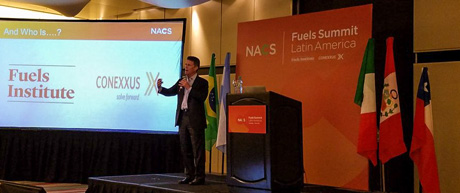 BUENOS AIRES – The NACS Fuels Summit Latin America kicked off this week in Buenos Aires, Argentina, taking a strategic approach to analyzing the evolution of the region’s fuels and transportation market with a focus on the long-term implications for the convenience retail industry. More than 70 attendees with operations in more than 15 countries are participating in the inaugural event, which is co-hosted by the Fuels Institute and Conexxus and sponsored by Wayne Fueling Systems.
BUENOS AIRES – The NACS Fuels Summit Latin America kicked off this week in Buenos Aires, Argentina, taking a strategic approach to analyzing the evolution of the region’s fuels and transportation market with a focus on the long-term implications for the convenience retail industry. More than 70 attendees with operations in more than 15 countries are participating in the inaugural event, which is co-hosted by the Fuels Institute and Conexxus and sponsored by Wayne Fueling Systems.
Beginning with a high-level look at macro-economic trends that impact the convenience and fuel retailing industry around the world, Dae Kim, NACS vice president of research, discussed the evolution of retail in general, characterized by the expansion of companies like Amazon that are threatening the traditional brick and mortar model. Kim pointed out that Amazon sells more than 400 million items, which is nearly four times more than Walmart. He noted that historically the convenience channel’s focus on selling “gas, cokes and smokes” needs to give way to a more strategic approach in which retailers focus on the intersection of where people live, where they buy things and how they move from point A to B. By capitalizing on the relationship between these critical ingredients, retailers can develop sustainable strategies.
Tammy Klein with Future Fuel Strategies articulated the importance of government initiatives in influencing the future direction of the fuels and vehicles market. Drawing from research she developed for the Fuels Institute that will be released next week, she described the numerous strategies nations and cities are implementing to address carbon emissions, local air quality concerns and urban congestion. From renewable fuel programs to fuel efficiency regulations, to zero emission vehicle mandates to bans on internal combustion engines and restrictions on city access for certain vehicle types, the long-term implications for the convenience and fuel retailing market could be significant. Markets that are not currently considering such initiatives should not assume they are immune, as the global pressures to address these key issues are significant and will likely affect markets throughout the world.
John Eichberger, executive director of the Fuels Institute, shared that Latin America only represents 3.8% of the global vehicle sales market. While Latin America accounts for nearly 11% of the population, this small market share signals that it does not have significant influence in the production plans of the automobile manufacturing industry. Consequently, as automakers develop vehicles to comply with the various regulations described by Klein, these technologies may enter the Latin American markets by default.
So much attention is paid to the market potential for electric vehicles that some forget the dominant position of the internal combustion engine throughout the world. John Gartner with Navigant Research spent considerable time discussing the future of electric, and even autonomous vehicles, but made it clear that the internal combustion engine is not dead but it is changing. He presented a forecast comparing U.S. gasoline demand with that of Latin America, which shows that as U.S. demand declines over the next 20 years, demand in Latin America is expected to increase modesty. But Gartner advised the attendees to not take this for granted, as the long-term future will be electric and it will come faster or slower depending on government programs.
Given that the region’s reliance on liquid fuels will remain unabated for the next several decades, Rob Smith with IHS Markit closed the day by analyzing the refined products market. He noted the refining industry production has declined in recent years, resulting an 270% increase in petroleum imports into Latin America in the past decade. During this time frame, product supplies from the U.S. have increased 340%. It is expected that U.S. product will continue to represent an increasingly important share of supplies throughout Latin America.
Today’s agenda will focus on the future of fuels, the role of technology in the retail business, the perspective of retail operators in the face of changing market pressures and strategies for enhancing the consumers’ experience at the pump.